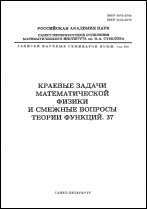|
|
Zapiski Nauchnykh Seminarov POMI, 2016, Volume 445, Pages 250–267
(Mi znsl6279)
|
 |
|
|
Extreme values of Epstein zeta-functions
O. M. Fomenko
St. Petersburg Department of Steklov Mathematical Institute of Russian Academy of Sciences, St. Petersburg, Russia
Abstract:
Let $Q(u_1,u_2,\dots,u_l)$ be a positive definite quadratic form in $l(\geq2)$ variables and with integer coefficients. Put
$$
\zeta_Q(s)=\sum'(Q(u_1,u_2,\dots,u_l))^{-s}
$$
where the accent indicates that the summation is over all integer $l$-tuples $(u_1,u_2,\dots,u_l)$ with the exception of $(0,0,\dots,0)$. It is known that $\zeta_Q(s)\big(s-\frac l2\big)$ is an entire function.
We treat $\Omega$-theorems for $\zeta_Q(s)l\leq3)$ and for some $\zeta_Q(s)(l=2)$. Let $l\leq4$ and $F_Q(s)=\zeta_Q\big(s+\frac l2-1\big)$. As $t$ tends to infinity, we have
$$
\log\bigg|F_Q\biggl(\frac12+it\biggr)\bigg|=\Omega_+\bigg(\bigg(\frac{\log t}{\log\log t}\bigg)^{1/2}\bigg),
$$
and
$$
\log |F_Q(\sigma_0+it)|=\Omega_+\bigg(\frac{(\log t)^{1-\sigma_0}}{\log\log t}\bigg)
$$
for fixed $\sigma_0\in\big(\frac12,1\big)$.
Key words and phrases:
Epstein zeta-function, quadratic form, extremal value.
Received: 09.03.2016
Citation:
O. M. Fomenko, “Extreme values of Epstein zeta-functions”, Analytical theory of numbers and theory of functions. Part 31, Zap. Nauchn. Sem. POMI, 445, POMI, St. Petersburg, 2016, 250–267; J. Math. Sci. (N. Y.), 222:5 (2017), 690–702
Linking options:
https://www.mathnet.ru/eng/znsl6279 https://www.mathnet.ru/eng/znsl/v445/p250
|

| Statistics & downloads: |
| Abstract page: | 181 | | Full-text PDF : | 40 | | References: | 33 |
|




 Contact us:
Contact us: Terms of Use
Terms of Use
 Registration to the website
Registration to the website Logotypes
Logotypes







 Citation in format
Citation in format 